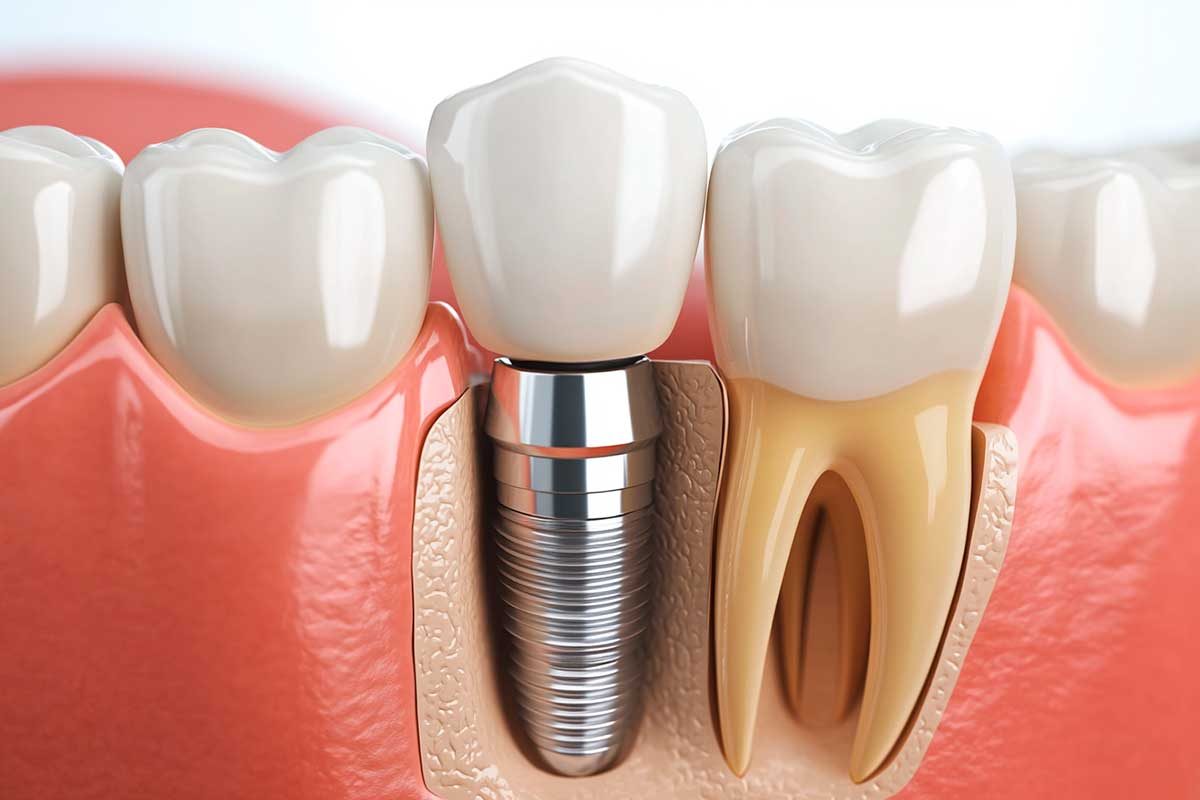
Dental Implant
What is a Dental Implant?
A dental implant is a permanent and effective solution for replacing missing teeth. It involves placing a titanium post into the jawbone, which acts as an artificial root to support a crown, bridge, or denture. Dental implants mimic the appearance and function of natural teeth, aiding in chewing, speaking, and aesthetics. Additionally, implants help prevent bone loss in the affected area, maintaining the integrity of the facial structure.
Specialties and Procedures
The specialist responsible for dental implants is an implantologist, a professional trained to perform implant placement surgery and ensure proper bone integration. After an initial evaluation, which includes imaging to assess bone health, the procedure is performed in stages, from the insertion of the post to the attachment of the final crown or prosthetic.
When to See a Dentist for Implants?
If you’ve lost one or more teeth, have difficulty chewing, or experience discomfort with removable dentures, you may be an ideal candidate for dental implants. Beyond restoring function, implants provide a long-term aesthetic solution, preventing issues like denture misalignment and preventing neighboring teeth from shifting.
Symptoms and How the Dentist Can Help
Tooth loss can lead to difficulties with chewing, bone loss, and speech issues. A dentist specializing in implants can evaluate your situation and propose the most suitable solution, ensuring that missing teeth are replaced with implants that offer the same stability and functionality as natural teeth. The treatment is personalized to ensure optimal adaptation and results.
Prevention and Care for Implants
To ensure the longevity of implants, it is important to maintain strict oral hygiene, including proper brushing and flossing. Regular dental visits are also essential to monitor the health of the implant and surrounding tissue. Additionally, avoiding harmful habits like smoking and excessive consumption of hard foods will contribute to the long-term success of the implant.
Implant Treatments
Single Tooth Implant
A single-tooth implant is ideal for patients who have lost one tooth. After the titanium post is inserted into the jawbone, the dentist waits for osseointegration, which may take a few months. A custom crown is then attached to the post, ensuring a natural look and function.
In addition to restoring chewing function, a single-tooth implant prevents bone loss and adjacent teeth from shifting, ensuring a healthy and complete smile. With proper care, this treatment can last decades, offering a permanent solution for tooth loss.
Multiple Implants
For patients who have lost several teeth, multiple implants can provide a solid foundation for bridges or crowns. Rather than using implants for every missing tooth, the dentist strategically places two or more posts to support a dental bridge.
This treatment reduces the need for removable dentures, offering greater stability and comfort compared to traditional methods. Additionally, it preserves the jawbone and enhances the appearance and function of teeth for long-lasting results.
Implant-Supported Dentures (Overdentures)
For patients who have lost all teeth in an arch, implant-supported dentures, known as overdentures, are an excellent alternative. Several implants are inserted into the jawbone, providing anchorage for a removable denture that fits securely, offering greater stability and comfort.
This technique is ideal for patients who want more security than conventional dentures provide, improving chewing and preventing discomfort caused by loose dentures. Overdentures are a balanced solution between functionality and cost.
Zygomatic Implants
For patients with insufficient jawbone structure, zygomatic implants offer an innovative solution. Unlike traditional implants, these posts are anchored directly into the zygomatic bone (cheekbone), providing stable support for Dental Prosthetics.
Although this is a more complex procedure, zygomatic implants allow patients with severe bone loss to receive dental implants without the need for bone grafting, making the treatment faster and more accessible.
Pre-Implant Bone Grafting
Before receiving a dental implant, some patients may need bone grafting to increase bone density in the area where the implant will be placed. Bone grafting can be done using synthetic material or the patient’s own bone and aims to ensure that the implant post has adequate support.
This procedure is essential for ensuring the long-term success of the implant, providing a solid foundation and preventing treatment failure.
Dental Implants at Clinic Consultation
At Clinic Consultation, our implant specialists use the most modern techniques to ensure long-lasting and aesthetically perfect results. If you are looking for a permanent solution to tooth loss, our professionals are ready to offer the best personalized treatment for you.
Click the button below to schedule your appointment online.